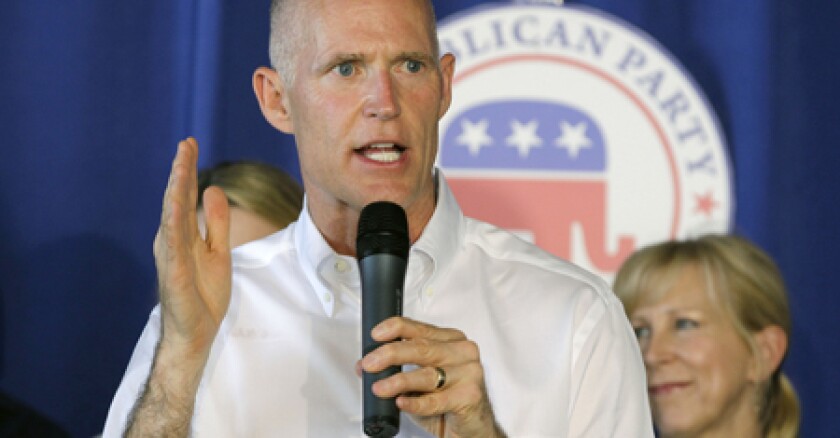He characterized the hourlong meeting as “hopefully productive." Marilyn Tavenner, director of the Centers for Medicare and Medicaid Services (CMS), also attended.
“I’m responsible for Florida families. In our state, as I talk to families, they’re worry about their jobs, they’re worried about the cost of living, and they’re worried about education,” Scott said in a quick briefing after the meeting. “So what we’re worried about with this, if the President’s health care law is implemented in Florida with regard to the exchange or the expansion…how it will impact each of our families? We cannot have an adverse effect on their access to health care or their cost of health care.”
The meeting centered on the ACA’s Medicaid expansion and the possibility of Florida pursuing a partnership health exchange. Those are the two provisions of the ACA that both require heavy state involvement to implement and put Republican governors at odds with the Obama administration.
According to a description of the meeting provided by an HHS official, Sebelius pledged to work with Scott and his state to implement the law. She encouraged Scott to pursue a partnership exchange rather than opt for a fully federal exchange, which aligns with most analysts’ expectations that the White House will push states in that direction. In discussing the Medicaid expansion, Sebelius reminded Scott that Florida has the third-highest uninsured rate in the nation, according to the HHS official, and used the 100 percent federal match for the first three years as the central part of that pitch.
In some sense, Scott serves as a proxy for all the Republican governors who have been skeptical about expanding their Medicaid rolls in 2014 or taking any ownership of the exchanges, online insurance marketplaces that will open later this year. Since Obama’s re-election, which all but eliminated the possibility that the ACA would be repealed, GOP governors have repeatedly said that they didn’t have enough information about the law’s costs and HHS’s requirements to make those decisions.
Scott echoed that sentiment when asked if he might pursue a partnership exchange. Under a partnership model, states can handle some of the regulatory and customer service elements of the exchange, as opposed to having the federal government run the whole show. HHS released new guidance on the partnerships last week, viewed by many as an effort to entice the 30-or-so undecided states to take a partnership, which would presumably lighten the administrative load for HHS. States must decide by Feb. 15 if they’ll do a partnership exchange.
“What I’ve asked is: I need more information to make sure we understand how it’s going to impact every Florida family,” Scott said. “Is it going to impact their access to health care, their quality of health care, their cost of health care? And as we do that, I’m going to do the best thing for Florida families.”
The governor seemed skeptical about expanding Medicaid to 133 percent of the federal poverty level, the new ACA threshold that the Supreme Court made optional in its decision last summer. He repeated on several occasions that the Florida Health Care Administration has estimated that the expansion would cost Florida as much as $26 billion in the next 10 years after the 100 percent federal match started to phase down in 2017. Other estimates from the Urban Institute, though, have placed the cost as low as $5.4 billion. As many as 1.8 million people could qualify if the state fully expanded Medicaid.
Scott hinted at his fear, common among Medicaid officials, that the enhanced federal match for the expansion (never to be less than 90 percent, under the law) could be changed during the upcoming deficit reduction negotiations or in any future deficit reduction deals.
“Let’s all remember: growing government is never free. It always costs money,” Scott said.
Florida, under Scott’s direction, led the charge to overturn the ACA, which ended in the Supreme Court last June with most of the law upheld. Until that point, Scott had expressed adamant opposition to implementing any part of the law. But after Obama’s reelection, Scott began to express a willingness to at least discuss expanding Medicaid or having a role in the health exchange.
On Monday, he said he expected more meetings with HHS officials in the future.









